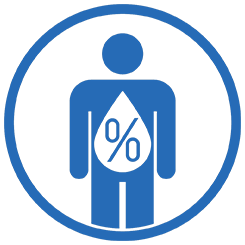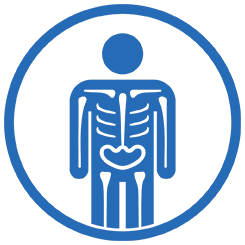Schedule a FREE Body Composition test with us, today!
Body Fat Percentage:
 Body Fat Percentage is the proportion of fat to the total body weight. Body fat is essential for maintaining body temperature, cushioning joints and protecting internal organs.
Body Fat Percentage is the proportion of fat to the total body weight. Body fat is essential for maintaining body temperature, cushioning joints and protecting internal organs.
The energy, or calories, our body needs comes from what we eat and drink. Energy is burned through physical activity and general bodily functions. If you consume the same number of calories as you burn, all the calories are converted into energy. But if you consume more than you burn, excess calories are stored in fat cells. If this stored fat is not converted into energy later, it creates excess body fat. Too much fat can damage your long-term health. Reducing excess levels of body fat has been shown to directly reduce the risk of certain conditions such as high blood pressure, heart disease, type 2 diabetes and certain cancers. Too little body fat may lead to osteoporosis in later years, irregular periods in women and possible infertility. These measurements are available for everyone from age five to 99 years.
Muscle Mass:
 The predicted weight of muscle in your body.
The predicted weight of muscle in your body.
Muscle mass includes the skeletal muscles, smooth muscles such as cardiac and digestive muscles and the water contained in these muscles. Muscles act as an engine in consuming energy. As your muscle mass increases, the rate at which you burn energy (calories) increases which accelerates your basal metabolic rate (BMR) and helps you reduce excess body fat levels and lose weight in a healthy way. If you are exercising hard, your muscle mass will increase and may increase your total body weight too. That’s why it’s important to monitor your measurements regularly to see the impact of your training program on your muscle mass.
Total Body Water:
 Total Body Water is the total amount of fluid in the body expressed as a percentage of total weight. Water is an essential part of staying healthy. Over half the body consists of water. It regulates body temperature and helps eliminate waste. You lose water continuously through urination, sweat, and breathing, so it’s important to keep replacing it. The amount of fluid needed every day varies from person to person, and is affected by climatic conditions, how much physical activity you undertake, your diet, and much more. Being well hydrated helps concentration levels, sports performance and general wellbeing. Experts recommend that you should drink at least two liters of fluid each day, preferably water or other low calorie drinks. If you are training, it’s important to increase your fluid intake to ensure peak performance at all times.
Total Body Water is the total amount of fluid in the body expressed as a percentage of total weight. Water is an essential part of staying healthy. Over half the body consists of water. It regulates body temperature and helps eliminate waste. You lose water continuously through urination, sweat, and breathing, so it’s important to keep replacing it. The amount of fluid needed every day varies from person to person, and is affected by climatic conditions, how much physical activity you undertake, your diet, and much more. Being well hydrated helps concentration levels, sports performance and general wellbeing. Experts recommend that you should drink at least two liters of fluid each day, preferably water or other low calorie drinks. If you are training, it’s important to increase your fluid intake to ensure peak performance at all times.
Read all about body water.
The average TBW% ranges for a healthy person are:
Female 45% to 60%
Male 50% to 65%
Bone Mass:
 The predicted weight of bone mineral in your body.
The predicted weight of bone mineral in your body.
While your bone mass is unlikely to undergo noticeable changes in the short term, it’s important to maintain healthy bones by having a balanced diet rich in calcium and by doing plenty of weight-bearing exercise.
You should track your bone mass over time and look for any long term changes.
Additional helpful information
Basal Metabolic Rate (BMR)
 The daily minimum level of energy or calories your body requires when at rest (including sleeping) in order to function effectively.
The daily minimum level of energy or calories your body requires when at rest (including sleeping) in order to function effectively.
Increasing muscle mass will speed up your basal metabolic rate (BMR). A person with a high BMR burns more calories at rest than a person with a low BMR. About 70% of calories consumed every day are used for your basal metabolism. Increasing your muscle mass helps raise your BMR, which increases the number of calories you burn and helps to decrease body fat levels. Your BMR measurement can be used as a minimum baseline for a diet program. Additional calories can be included depending on your activity level. The more active you are the more calories you burn and the more muscle you build, so you need to ensure you consume enough calories to keep your body fit and healthy.
As people age their metabolic rate changes. Basal metabolism rises as a child matures and peaks at around 16 or 17, after which point it typically starts to decrease. A slow BMR will make it harder to lose body fat and overall weight.
